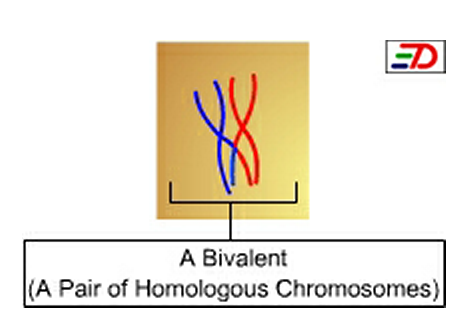|
Bivalent
Bivalent may refer to: * Bivalent (chemistry), a molecule formed from two or more atoms bound together *Bivalent (engine), an engine that can operate on two different types of fuel *Bivalent (genetics), a pair of homologous chromosomes *Bivalent logic In logic, the semantic principle (or law) of bivalence states that every declarative sentence expressing a proposition (of a theory under inspection) has exactly one truth value, either true or false. A logic satisfying this principle is calle ..., a classical logic of two values, true and false * Bivalent vaccine, a vaccine directed at two pathogens or two strains of a pathogen *A verb with a valency of two See also * {{disambig ... [...More Info...] [...Related Items...] OR: [Wikipedia] [Google] [Baidu] |
Bivalent (genetics)
A bivalent is one pair of chromosomes (sister chromatids) in a tetrad. A tetrad is the association of a pair of homologous chromosomes (4 sister chromatids) physically held together by at least one DNA crossover. This physical attachment allows for alignment and segregation of the homologous chromosomes in the first meiotic division. In most organisms, each replicated chromosome (composed of two identical sisters chromatid) elicits formation of DNA double-strand breaks during the leptotene phase. These breaks are repaired by homologous recombination, that uses the homologous chromosome as a template for repair. The search for the homologous target, helped by numerous proteins collectively referred as the synaptonemal complex, cause the two homologs to pair, between the leptotene and the pachytene phases of meiosis I Contents * 1 Formation * 2 Structure * 3 Function * 4 References Formation The formation of a bivalent occurs during the first division of meiosis (in the Z ... [...More Info...] [...Related Items...] OR: [Wikipedia] [Google] [Baidu] |
Bivalent (engine)
A bivalent engine is an engine that can use two different types of fuel. Examples are petroleum/CNG and petroleum/ LPG engines, which are widely available in the European passenger vehicle aftermarket. Types Alcohol and Petroleum Engines that can use either alcohol (often produced as a biofuel) or standard gasoline are variants of flex fuel vehicles. Such vehicles are in production and commonly available for sale in the United States and other countries. Compressed or Liquefied Natural Gas and Petroleum Compressed natural gas (CNG) is made by compressing methane to store it high pressures. Liquefied natural gas (LNG) is made and stored cryogenically, much like liquid hydrogen. The physical properties of natural gas require the compression ratio of the engine to be higher than in normal internal combustion engines, and the higher compression makes for greater efficiency. Natural gas also has a higher octane rating, so it can be burned at a higher temperature, reducing engi ... [...More Info...] [...Related Items...] OR: [Wikipedia] [Google] [Baidu] |
Bivalent Logic
In logic, the semantic principle (or law) of bivalence states that every declarative sentence expressing a proposition (of a theory under inspection) has exactly one truth value, either true or false. A logic satisfying this principle is called a two-valued logic or bivalent logic. In formal logic, the principle of bivalence becomes a property that a semantics may or may not possess. It is not the same as the law of excluded middle, however, and a semantics may satisfy that law without being bivalent. The principle of bivalence is studied in philosophical logic to address the question of which natural-language statements have a well-defined truth value. Sentences that predict events in the future, and sentences that seem open to interpretation, are particularly difficult for philosophers who hold that the principle of bivalence applies to all declarative natural-language statements. Many-valued logics formalize ideas that a realistic characterization of the notion of conseque ... [...More Info...] [...Related Items...] OR: [Wikipedia] [Google] [Baidu] |
Bivalent (chemistry)
In chemistry, the valence (US spelling) or valency (British spelling) of an element is the measure of its combining capacity with other atoms when it forms chemical compounds or molecules. Description The combining capacity, or affinity of an atom of a given element is determined by the number of hydrogen atoms that it combines with. In methane, carbon has a valence of 4; in ammonia, nitrogen has a valence of 3; in water, oxygen has a valence of 2; and in hydrogen chloride, chlorine has a valence of 1. Chlorine, as it has a valence of one, can be substituted for hydrogen. Phosphorus has a valence of 5 in phosphorus pentachloride, . Valence diagrams of a compound represent the connectivity of the elements, with lines drawn between two elements, sometimes called bonds, representing a saturated valency for each element. The two tables below show some examples of different compounds, their valence diagrams, and the valences for each element of the compound. Modern definitions ... [...More Info...] [...Related Items...] OR: [Wikipedia] [Google] [Baidu] |
Bivalent Vaccine
A vaccine is a biological Dosage form, preparation that provides active acquired immunity to a particular infectious disease, infectious or cancer, malignant disease. The safety and effectiveness of vaccines has been widely studied and verified. A vaccine typically contains an agent that resembles a disease-causing microorganism and is often made from weakened or Antigen, killed forms of the microbe, its toxins, or one of its surface proteins. The agent stimulates the body's immune system to recognize the agent as a threat, destroy it, and to further recognize and destroy any of the microorganisms associated with that agent that it may encounter in the future. Vaccines can be prophylaxis, prophylactic (to prevent or ameliorate the effects of a future infection by a natural or "wild" pathogen), or therapeutic vaccines, therapeutic (to fight a disease that has already occurred, such as cancer vaccine, cancer). [...More Info...] [...Related Items...] OR: [Wikipedia] [Google] [Baidu] |

